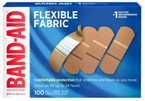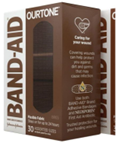Johnson & Johnson Lawsuit Alleges Band-Aids Contain Toxic Forever Chemicals
Last Updated on July 16, 2024
Johnson & Johnson faces a new proposed class action lawsuit that alleges the pharma giant’s ubiquitous Band-Aid products, unbeknownst to consumers, contain toxic “forever chemicals,” which can be harmful to humans even at very low levels.
Have you bought Band-Aid Flexible Fabric Comfortable Protection, Water Block Tough-Strips, or OURTONE Flexible Fabric Bandages? Let us know here.
The 34-page Johnson & Johnson lawsuit says that although millions of people use Band-Aids every day to treat cuts, scrapes and burns, consumers are unaware that the “#1 Doctor Recommended” products contain synthetic chemicals known as per- and polyfluoroalkyl substances—PFAS—which have been linked to liver damage, decreased fertility, thyroid disorders and various cancers, among other adverse health effects.
Be sure to scroll down to see which Band-Aid products allegedly contain PFAS.
Forever chemicals earned that moniker due to their propensity to break down very slowly and build up in the human body and the environment over time, the suit relays. The filing emphasizes that there is no safe level of exposure to PFAS and no effective treatment to remove them from the body. Children may be more vulnerable to the effects of forever chemical exposure, as PFAS have been linked to lower antibody responses to some vaccines, the lawsuit adds.
Want to stay in the loop on class actions that matter to you? Sign up for ClassAction.org’s free weekly newsletter here.
According to the complaint, filed against Johnson & Johnson and Kenvue, the former J&J unit that now independently owns the Band-Aid brand, reasonable consumers have bought and continue to buy Band-Aids under the belief that the products are free from synthetic chemicals that could harm their and their families’ health. Proposed class members would not have purchased the Band-Aid products at issue “had they known the truth,” the class action lawsuit says. “For over 100 years, Johnson & Johnson, and then recently Kenvue, has cultivated a brand image of quality, trustworthiness, safety, and health,” the case reads. “However, Defendants’ packaging of the Products does not disclose the presence of PFAS chemicals.”

The PFAS lawsuit was filed on April 10, 2023, the same day the Biden administration finalized stringent limits on forever chemicals in drinking water. The new rule is the first-ever national drinking water limit on toxic PFAS and will require utilities to reduce forever chemicals in drinking water to the lowest level to which they can be reliably measured.
Consumer watchdog study finds PFAS in bandages, including Band-Aids
Central to the PFAS lawsuit is a study by consumer watchdog group Mamavation, whose focus is “eco-wellness product investigations for moms.” To help consumers avoid the dangers of forever chemicals, Mamavation has commissioned studies on a litany of beauty and cosmetic products, foods and beverages, clothing, food packaging, supplements, menstrual products, baby and children’s items, cleaning and laundry supplies, and more, including popular brands of bandages, the suit explains.
According to the complaint, Mamavation sent 40 bandages spanning 18 brands, including the Band-Aid products at issue, for testing at an EPA-certified lab that used organic fluorine marker testing to spot the potential presence of PFAS. This type of marker testing is “likely to show the presence of PFAS” given organic fluorine is the foundational element of forever chemicals and can also capture other PFAS toxins such as fluoropolymers, pharmaceuticals and hydrofluorocarbon refrigerators, the lawsuit shares.
Crucially, it is “nearly impossible” for organic fluorine testing to yield a false positive detection of PFAS in a sample, the case stresses.
Organic fluorine is not naturally present in the human body, and is practically nonexistent outside of its use in man-made PFAS chemicals.
In light of the limitations of targeted testing, total organic fluorine testing is the only method that is able to reliably detect the presence or absence of the thousands of varieties of PFAS chemicals for which targeted testing is not currently available.”
Mamavation’s testing of the subject bandages found levels of PFAS in Band-Aid products ranging from 188 parts per million (ppm) to 262 ppm, with the sticky flaps of Band-Aid’s OURTONE Flexible Fabric bandages containing more than 370 ppm, the lawsuit states.

A 2022 Environmental Protection Agency (EPA) advisory set lifetime health advisory levels for PFOA and PFOS, two kinds of forever chemicals, at 0.004 parts per trillion and 0.02 ppt, respectively, the case says. Importantly, these levels are “below the detection capability of most measurement devices,” meaning the EPA considers any readings of PFOA or PFOS to exceed the lifetime advisory limit, the case notes.
Ultimately, the foregoing means that the PFAS found by Mamavation in Band-Aid products goes “well beyond the limitations set forth by the government on drinking water,” the lawsuit summarizes.
Which Band-Aids allegedly contain PFAS?
The Band-Aid lawsuit alleges Band-Aid Flexible Fabric Comfortable Protection Bandages, Band-Aid OURTONE Flexible Fabric BR45 Bandages, Band-Aid OURTONE Flexible Fabric BR55 Bandages, and Band-Aid OURTONE Flexible Fabric BR65 Bandages, and potentially other Band-Aid products, contain harmful forever chemicals.
Have you bought Band-Aid Flexible Fabric Comfortable Protection, Water Block Tough-Strips, or OURTONE Flexible Fabric Bandages? Let us know here.
Who’s covered by the Band-Aids forever chemicals lawsuit?
The Johnson & Johnson class action lawsuit looks to cover all persons in the United States who have bought any of the Band-Aid products listed on this page within the applicable statute of limitations period.
I have bought Band-Aids. Do I qualify to join the lawsuit?
When a class action lawsuit is initially filed, there’s usually nothing you need to do to join, sign up for, or add your name to the case to qualify. It’s typically only in the event of a class action settlement that the people covered by the suit would need to act, usually by filling out and filing a claim form online or by mail.
ClassAction.org will update this page with any developments, so be sure to check back often.
Are you owed unclaimed settlement money? Check out our class action rebates page full of open class action settlements.
Video Game Addiction Lawsuits
If your child suffers from video game addiction — including Fortnite addiction or Roblox addiction — you may be able to take legal action. Gamers 18 to 22 may also qualify.
Learn more:Video Game Addiction Lawsuit
Depo-Provera Lawsuits
Anyone who received Depo-Provera or Depo-Provera SubQ injections and has been diagnosed with meningioma, a type of brain tumor, may be able to take legal action.
Read more: Depo-Provera Lawsuit
How Do I Join a Class Action Lawsuit?
Did you know there's usually nothing you need to do to join, sign up for, or add your name to new class action lawsuits when they're initially filed?
Read more here: How Do I Join a Class Action Lawsuit?
Stay Current
Sign Up For
Our Newsletter
New cases and investigations, settlement deadlines, and news straight to your inbox.
Before commenting, please review our comment policy.